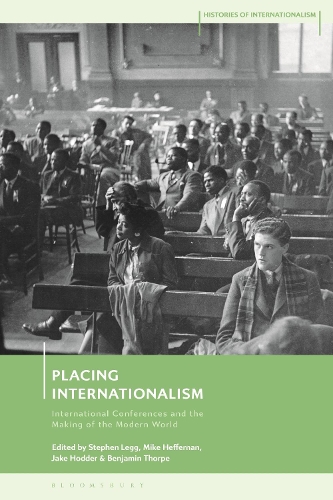
Placing Internationalism: International Conferences and the Making of the Modern World
(Hardback)
Available Formats
Publishing Details
Placing Internationalism: International Conferences and the Making of the Modern World
By (Author) Stephen Legg
Edited by Mike Heffernan
Edited by Jake Hodder
Edited by Benjamin Thorpe
Bloomsbury Publishing PLC
Bloomsbury Academic
16th December 2021
United Kingdom
Classifications
Tertiary Education
Non Fiction
History of other geographical groupings and regions or specific cultures / socie
Social and cultural history
320.548
Physical Properties
Hardback
288
Width 162mm, Height 236mm, Spine 22mm
560g
Description
Exploring how modern internationalism emerged as a negotiated process through international conferences, this edited collection studies the spaces and networks through which states, civil society institutions and anti-colonial political networks used these events to realise their visions of the international. Taking an interdisciplinary approach, contributors explore the spatial paradox of two fundamental features of modern internationalism. First, internationalism demanded the overcoming of space, transcending the nation-state in search of the shared interests of humankind. Second, internationalism was geographically contingent on the places in which people came together to conceive and enact their internationalist ideas. From Paris 1919 to Bandung 1955 and beyond, this book explores international conferences as the sites in which different forms of internationalism assumed material and social form. While international permanent institutions such as the League of Nations, UN and Institute of Pacific Relations constantly negotiated national and imperial politics, lesser-resourced political networks also used international conferences to forward their more radical demands. Taken together these conferences radically expand our conception of where and how modern internationalism emerged, and make the case for focusing on internationalism in a contemporary moment when its merits are being called into question.
Reviews
It is commonplace to single out international conferences such as those at Paris in 1919 and at Bretton Woods in 1944 as important turning points in world history. This book reminds us how important conferences, easily dismissed as 'talking shops,' have been in the evolution of international cooperation in general. * John Agnew, Professor, UCLA, USA *
This volume presents a successful outcome of interdisciplinarity to stimulate lively intellectual conversations. It makes an exciting intervention in our understanding of the international, with the critical scrutiny of geographers on what place means, coupled with the depth of historical engagement that historians can offer. * Naoko Shimazu, Professor, Yale-NUS College and Asia Research Institute, National University of Singapore, Singapore *
If you think that international conferencing is not a practice you need to read up on, think again! This is a rich collection on the kinds of places that, while vital instruments of international governance, are often delegated to footnotes. An excellent read to those interested in international affairs. * Merje Kuus, Distinguished Professor of Geography, The University of British Columbia, Canada *
Author Bio
Stephen Legg is Professor Historical Geography at the University of Nottingham, UK, where he has taught since 2006. His research focuses on interwar India as situated within the context of late-colonial imperialism and modern internationalism. He was the Principal Investigator on the AHRC grant project Conferencing the International: a cultural and historical geography of the origins of internationalism, 1919-39 and is currently an editor of the Journal of Historical Geography. Michael Heffernan is Professor of Historical Geography at the University of Nottingham, UK. The author of Geographies of the University and Mobilities of Knowledge his expertise lies in twentieth-century internationalism and historical and political geographies of twentieth-century warfare. Jake Hodder is Assistant Professor of Geography at University of Nottingham, UK. A historical and political geographer his research interests intersect between internationalism, race and archives. Benjamin Thorpe is a Research Fellow in the School of Geography at University of Nottingham, UK.
